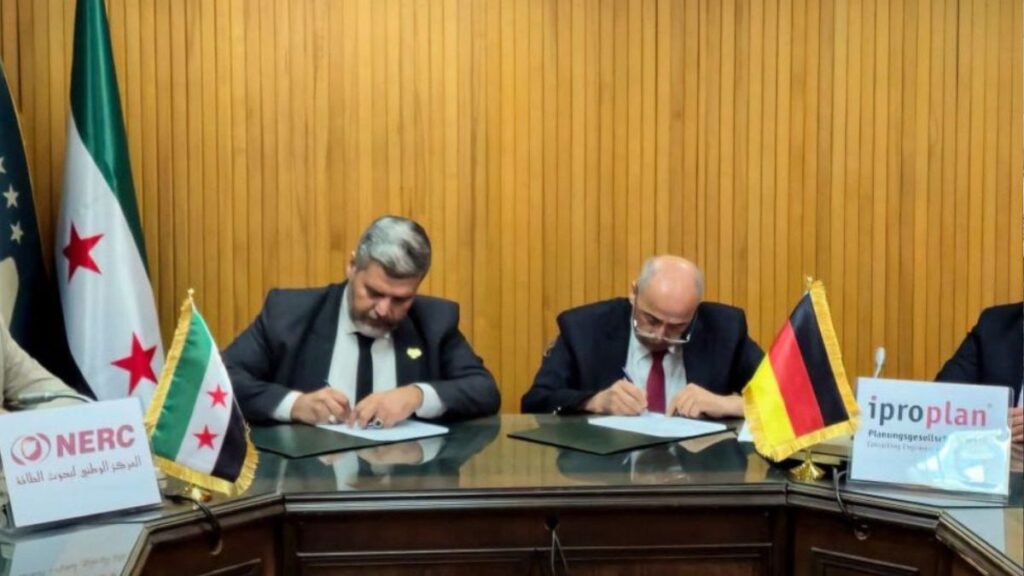The National Energy Research Center at the Ministry of Energy signed a memorandum of understanding with the German company Iproplan and the University of Rostock on Monday, October 13, to train engineering staff and update Syria’s building thermal insulation code.
According to the state-run al-Ikhbariyah channel, the memorandum aims to implement a training project to qualify engineers in optimal thermal design for buildings and to update the thermal insulation code that has been in force in Syria since 2007.
Youssef Hassoun, director of the National Energy Research Center, told the Syrian Arab News Agency (SANA) that the memorandum’s goal is to provide optimal training for Syrian engineering cadres in building energy saving, alongside updating the thermal insulation code. He added that, from a reconstruction standpoint, the memorandum seeks to ensure codes aligned with the principle of energy efficiency amid Syria’s high energy needs, so that insulation is used optimally to achieve the required performance in buildings.
Saad al-Baradei, head of Building Physics and Sustainability at the German company Iproplan, explained that the memorandum runs for two years and includes developing a “thermal insulation atlas” and procuring some of the equipment needed for implementation. He said the key objective is to advance energy-efficiency practices in architectural facilities by drawing on German expertise.
The signing took place in the presence of the Assistant Minister of Energy for Electricity Affairs, Omar Shaqruk, the Center’s director, Youssef Hassoun, and Iproplan’s representative, Saad al-Baradei.
Syria’s state-run al-Ikhbariyah channel, framed the cooperation as part of government efforts to support reconstruction and development, raise energy efficiency in the building sector in line with the latest international standards, and open avenues for Syria’s economy to re-engage with global markets.
The University of Rostock is a public university based in the city of Rostock in the German state of Mecklenburg-Vorpommern; it is one of the oldest universities in Northern Europe and the Baltic region, and the third-oldest German university still operating. Iproplan is a German firm specializing in architecture, consultancy, project management, and architectural and civil planning.
Broader energy cooperation
In late August, Syria’s Minister of Energy, Mohammed al-Bashir, held an official meeting with Germany’s ambassador, Clemens Hach, attended by a delegation from Siemens, to discuss strengthening Syrian–German cooperation in the energy sector. The talks covered Syria’s energy needs and potential investment opportunities for German companies in strategic projects to improve infrastructure and boost power generation efficiency. Al-Bashir stressed the importance of partnering with international companies and welcomed initiatives that support sustainable energy solutions.
Two MoUs on renewables
Separately, on October 1, the General Organization for Electricity Transmission and Distribution signed two memorandums of understanding with Saudi companies and an agreement with the Syrian–Turkish company STE to scale up renewable-energy projects.
Ibrahim al-Amin, representing the Saudi contracting company “al-Harfi,” told SANA that his firm signed an MoU with the public electricity organization to implement wind and solar power projects with a combined capacity of up to 200 MW. He said the agreement envisions constructing two solar plants over the next 24 months, in addition to an agreement to build a 200-MW wind farm and another solar station for connection to the main grid to supply Damascus and its environs.
Mahmoud al-Maghribi, director-general of the Saudi company “Skelco,” said a memorandum was signed to produce 100 MW in the Deir Ali area (southern Rural Damascus), noting the project will be implemented in phases and fully completed in 2026.
The Organization also signed an agreement with the Syrian–Turkish company STE to purchase 100 MW of solar energy. Yahya Taljabini, representing STE, said the solar project will be implemented in Homs (central Syria) to feed power into the grid in the governorate and neighboring areas, with completion expected within a maximum of a year and a half.
Syrian–German cooperation to update Syria’s thermal insulation code for buildings Enab Baladi.
Hence then, the article about syrian german cooperation to update syria s thermal insulation code for buildings was published today ( ) and is available on ُEnabbaladi ( Syria ) The editorial team at PressBee has edited and verified it, and it may have been modified, fully republished, or quoted. You can read and follow the updates of this news or article from its original source.
Read More Details
Finally We wish PressBee provided you with enough information of ( Syrian–German cooperation to update Syria’s thermal insulation code for buildings )
Also on site :
- Police: Two killed in shooting at West San Jose shopping center
- Judge Rules That ICE Agents Violate the Fourth Amendment by Making Arrests While Masked
- Google’s new 1.9GW clean energy deal includes massive 100-hour battery

